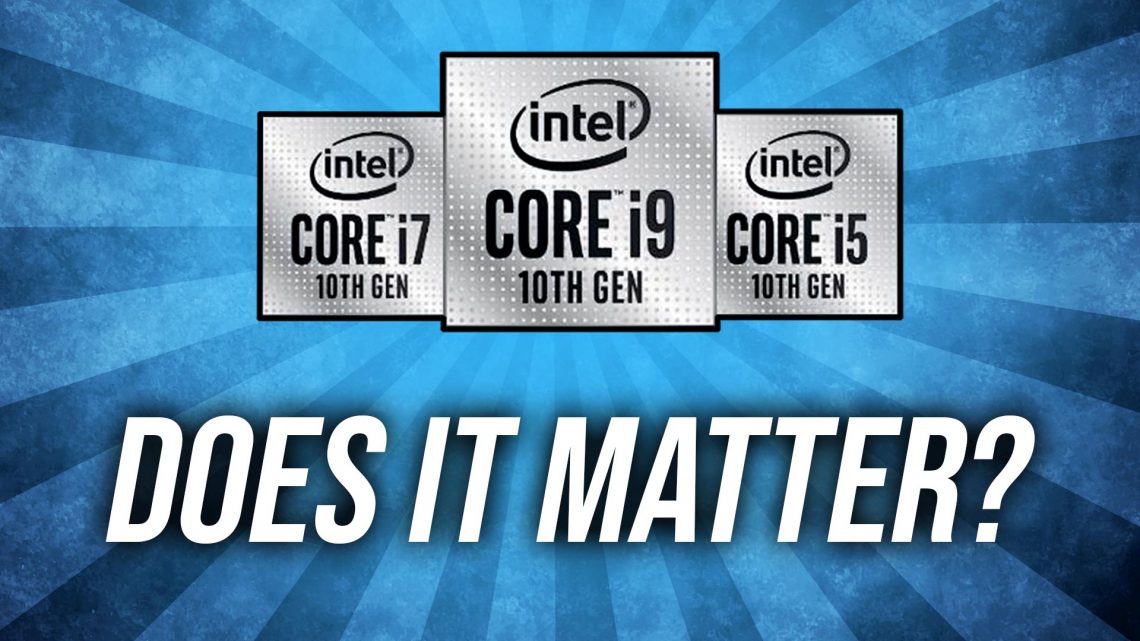
Why Intel 10th Gen Laptops Won’t Offer Much Improvement
Intel announced their new 10th generation H series processors for laptops on April 2nd 2020. Here’s why they probably won’t offer much of a performance improvement over the previous 9th generation.
Intel have been using 14nm for laptop processors since Skylake was introduced with the 6th generation in 2015. There have of course been improvements since this, however the most noteworthy performance jump was with 8th gen with the i7-8750H.
This is simply because of the jump up from 4 to 6 cores. If you’re a user who runs applications that benefit from multiple cores, this was a nice upgrade. If you’re just playing games though, the difference is minor in most titles.
When the 8750H refreshed to the 9750H in April 2019, there were only minor changes:
| i7-8750H | i7-9750H | |
|---|---|---|
| Cores/Threads | 6/12 | 6/12 |
| Base Clock | 2.2GHz | 2.6GHz |
| Single Core Turbo Boost | 4.1GHz | 4.5GHz |
| All Core Turbo Boost | 3.9GHz | 4.0GHz |
| Cache | 9MB | 12MB |
| Memory | DDR4-2666 | DDR4-2666 |
| TDP | 45W | 45W |
The bump to single core clock speed is only useful if a single core is active, which on a modern machine isn’t all that often, granted it depends on the workload. The all core turbo boost speed was only 100MHz higher with 9th gen, however in most cases this would make no difference. The 33% cache increase was probably the most important change here.
Why boosting clock speed hardly matters
Few laptops that I’ve tested can actually sustain a 4GHz all core turbo boost speed under a CPU load. This is even more difficult if the discrete graphics is in use, many laptops will lower the CPU power limit during such a combined workload to avoid getting too hot.
If the power limits are lowered, or there are otherwise thermal limitations, hitting the slightly higher all core turbo speed probably isn’t going to happen in a sustained workload. It may be beneficial for shorter burst style workloads, which for many users may actually be the majority of the work.
For consistent use, such as in a game or blender render for instance, raising the limit doesn’t matter if we could never reach the limit anyway.
10th generation improvements?
The new 10th generation version of the i7-9750H, the i7-10750H, has the same 6 cores/12 threads, same 12MB of cache, and same 2.6GHz base clock speed.
| i7-8750H | i7-9750H | i7-10750H | |
|---|---|---|---|
| Cores/Threads | 6/12 | 6/12 | 6/12 |
| Base Clock | 2.2GHz | 2.6GHz | 2.6GHz |
| Single Core Turbo Boost | 4.1GHz | 4.5GHz | 5.0GHz |
| All Core Turbo Boost | 3.9GHz | 4.0GHz | ??? |
| Cache | 9MB | 12MB | 12MB |
| Memory | DDR4-2666 | DDR4-2666 | DDR4-2933 |
| TDP | 45W | 45W | 45W |
The single core turbo has been boosted to 5GHz, so that may be useful for lightly threaded workloads, however this is a thermal velocity boost (TVB) number. This means that 5GHz will only be hit in single core workloads if thermals permit, so again likely for shorter burst style workloads.
The all core turbo boost speed wasn’t specified, however it wouldn’t surprise me if it was just another 100MHz boost. Regardless of what the difference there is, for most workloads it really doesn’t matter when most laptops with these chips aren’t able to hit the all core turbo boost speed in a sustained manner due to power/thermal limitations.
If it weren’t for the jump from DDR4-2666 to DDR4-2933, we’d probably be looking at a very minimal performance difference. That said, depending on the workload, that will likely still be the case if it isn’t that heavy on the memory.
Intel know the difference is small
When Intel first showed the 10th generation specs to media, their slides only compared 10th gen against 7th gen. Now, you could argue that someone buying a laptop will only be looking to do this every 3+ years or so, which is fair, however it’s worth remembering that after 7th gen was when we started to get more than 4 cores for laptops.
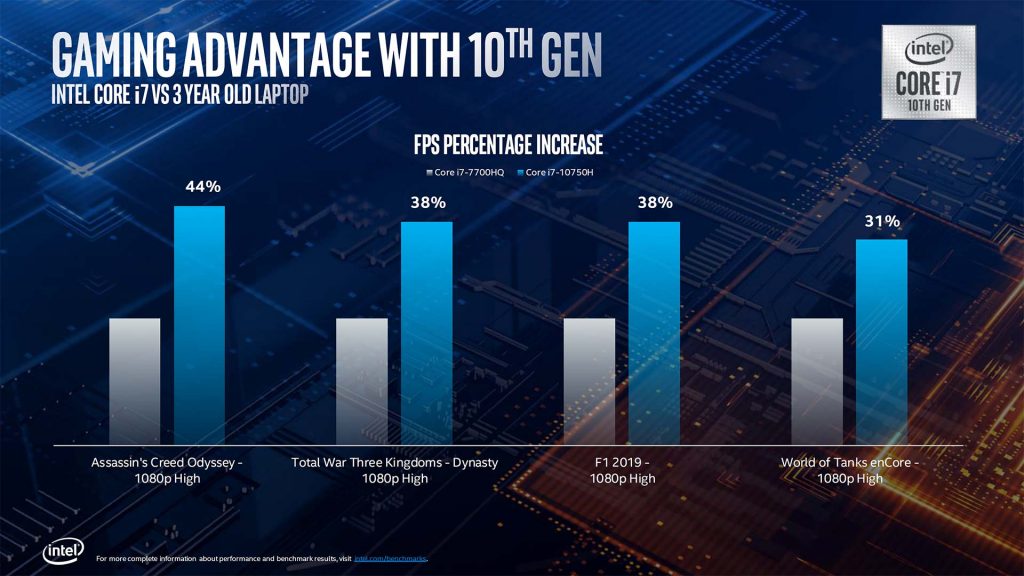
Additionally, if you read the fine print of the slides, the 7th gen laptop was paired with Nvidia GTX 1070 graphics, while the 10th gen laptop was paired with Nvidia RTX 2070 Super graphics.
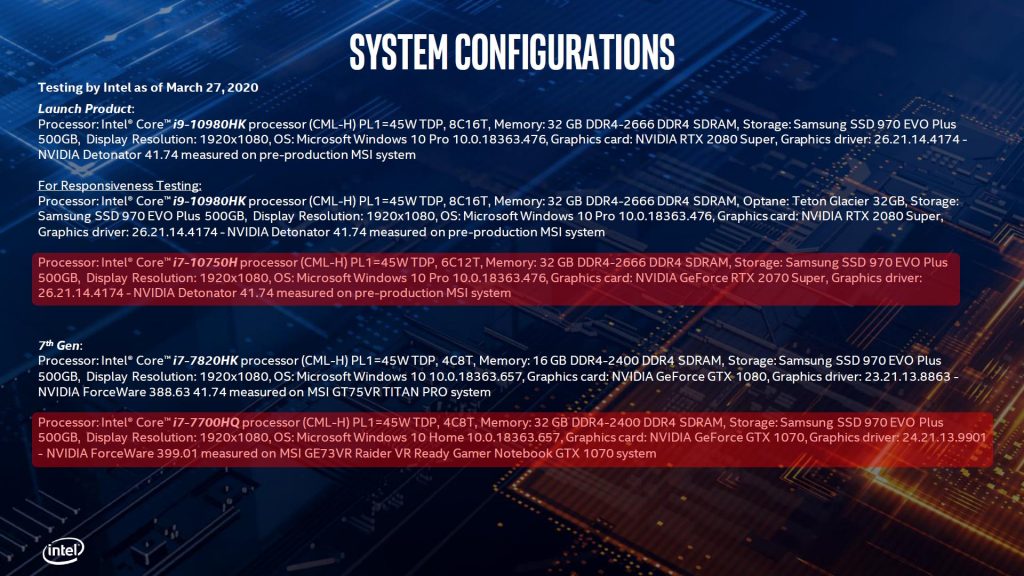
This is a fairly large difference, so the performance gains aren’t even entirely a result of the Intel processors anyway and could be more due to the difference in GPU power.
It can’t be that bad, right?
There’s some hope. For the first time, Intel based laptops will have an 8 core option in the i7 range. Prior to this, 8 cores was only available under the i9 branding, which of course comes with an associated price premium (though this could of course still b the case with the 8 core i7). Given that AMD’s Ryzen 4000 series offers 8 core chips in cheaper laptops compared to current Intel i9 based options, I am hoping to see the i7-10875H get used more as a competitive 8 core option to counter AMD’s offerings.
That said, based on the amount of power the 9th gen 8 core chips would suck down compared to say a 4900HS, we’re probably going to need high power limits with 10th gen which will result in heat. At the very least, I doubt we’ll see a 10875H in say a 14″ chassis as was the case with the 4900HS in the ASUS Zephyrus G14.
In the end, based on the information available so far prior to testing, Intel’s 10th generation mobile offering doesn’t look all that compelling compared to what they had last generation. We’re once more looking at a small improvement of 9th gen, which was a small improvement over 8th gen. At this point it seems like Intel are trying to draw blood from the 14nm stone.

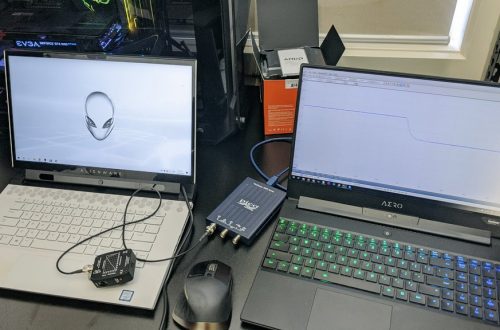
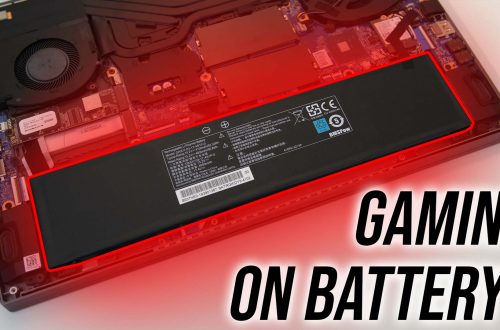
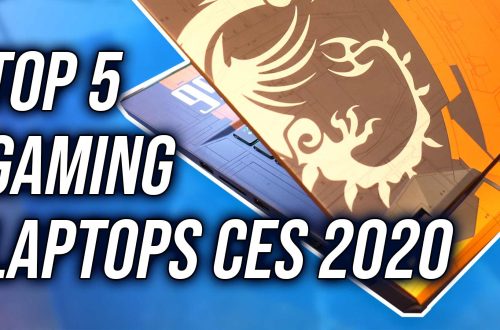
13 Comments
Sayandip Banik
I know you can’t say much because of the embargo but are you happy with the performance of the upcoming CPUs and GPUs in general or are the gains insignificant?
Jarrod
You’re right, I really can’t say, sorry!
Ifti Ahmed
Boring Intel 10 gen :
Pranshu Chittora
Based on this article, I have a question. Would it be better to go with an Intel 10th gen i7 + a higher tier GPU or the AMD 4900H/HS/4800H/HS with a 2060 or 2060 super? Because I don’t think Intel is gonna let OEM’s put higher tier GPUs such as the 2070 or 2080 in the AMD laptops. I would like to see if the AMD 4000 mobile chips can cover the gap between the different Nvidia GPUs. If you could make a video or even an article regarding this, it would be a great help for a lot of people.
Jarrod
Depends what you want, if you need GPU power, then Intel is the only option for now, but this will apparently change in future.
Pranshu Chittora
That didn’t really answer my question. What I want to know is if the 4800H can cover the gaming performance gap between a RTX 2060 and RTX 2070 if the RTX 2070 were to be paired with a i7-10750h or i7-10875h. Anything above this configuration will be too expensive anyway and most gaming laptop buyers will be going for these configurations.
Jarrod
No, I doubt it, but at the same time I haven’t had any 4800H laptops to test yet. From what I have heard from those with one, the gaming performance isn’t all that different vs i7.
Nisfu
Hi Jarrod,
I’ve watched your videos on YouTube and read the articles on your website. As such, I strongly believe that your recommendation will definitely makes sense and one that I would strongly be inclined to follow.
I am currently in a dilemma of choosing to purchase between two laptops namely the Aftershock Forge 15X (i7-10875H with RTX 2060 6GB GDDR6 *Max Performance Edition*) and Aftershock Forge 15R (Ryzen 5 3600 with RTX 2060 6GB GDDR6 *New 115W Superior Performance Version*).
I have tried my best to engage the people at Aftershock but all they could reply me with are generic answers and that just add on to the dilemma I am currently facing. I will be using the laptop for light Python programming, school usage and occasional gaming (e.g. COD Warzone).
From your expert point of view, which of the two laptops should I go for in this instance?
Jarrod
Either of those machines will play any game with high settings no trouble at all. I haven’t tested either of them so hard to say, but at least with the Ryzen 3600 one it uses a desktop CPU, so in theory you have the option of upgrading it in future, that is a very rare option when it comes to laptops.
Pranav
Hey jarrod irrelavent to this article, which helios 300 is a better buy. 1660ti or 2060 one. The price differnce is huge like 200-300$. But from what I have seen 2060 is just as powerful as the helios 1660ti (for some reason 1660ti on helios performs way better compared to other laptops).
Jarrod
My next video in 13 hours from now is a 1660 Ti and 2060 comparison, check that out when it’s up.
Kris
Bought new laptop with i7-10750H.
My previous laptop was 2011 Asus k42ja with Core i5-540m, back from arrandale days lol.
Jarrod
Sounds like quite an improvement!